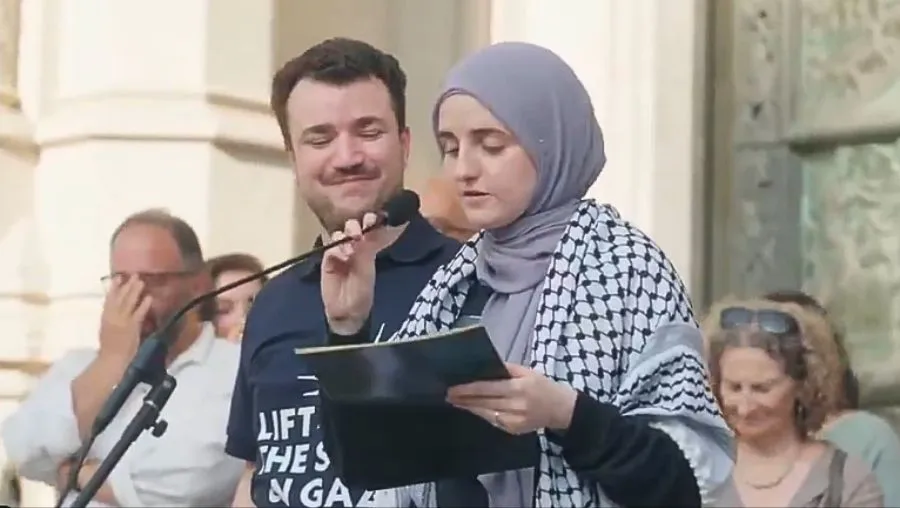An immigration court in Louisiana has sentenced pro-Palestinian activist Mahmoud Khalil to deportation to Syria or Algeria. The decision by Judge Jamee Comans carries the docket number “In the Matter of Mahmoud Khalil, A 206-913-742” and is based on the allegation that Khalil did not fully disclose previous activities and memberships in his green card application. Yet the case is far more than an administrative proceeding. It shows how immigration law under the Trump administration becomes a tool of political repression - and how a man known for nonviolent protest is criminalized without ever having committed a crime.
We know Judge Jamee Comans well for her practice, generally known for harsh rulings, unfairness and abuse. Her career is deeply rooted in the executive branch: as Deputy Chief Counsel at ICE (Immigration and Customs Enforcement) she herself was part of that machinery notorious for uncompromising severity in deportation matters - and she fully lived out that role there. That Louisiana, alongside Texas, has become one of the main arenas for such proceedings is no coincidence but calculation. In both states, extremely conservative, often openly racist authorities determine the practice. Here the political agenda is not concealed but staged as part of justice.

Khalil’s lawyers Hiba Abdeen and Daniel Greenfield point out in a filing with the federal court in Newark (docket 25-cv-11231, District of New Jersey) that Comans’ decision directly contradicts a federal ruling. Judge Michael Farbiarz had in June ruled that Khalil could not be deported while his case was being litigated. That case argues that Khalil’s detention and impending deportation are retaliation for his peaceful political engagement - in particular for his role as an organizer of nonviolent protests at Columbia University. At the center legally is a rarely used clause of immigration law that allows even lawful permanent residents to be deported if the Secretary of State defines their presence as harmful to foreign policy interests. That the government applies this exception against a man like Khalil raises serious questions: where does legitimate immigration policy end, and where does political persecution begin? Farbiarz had already in June made clear that a democracy cannot tolerate “politically motivated deportations.” Nevertheless, the government continues on this path undeterred.
Abdeen and Greenfield warn in their filing that Khalil’s situation is precarious. Although one can file an appeal with the Board of Immigration Appeals within 30 days, this path is considered hardly promising. The 5th Circuit Court of Appeals, which would then be responsible, almost never grants stays of deportation. In their brief, the lawyers therefore speak of a symbolic path without real prospect of success and point out that in fact only Farbiarz’s preliminary injunction prevents their client from immediate deportation. The political dimension of the case is obvious. Khalil, who was born in Syria and has lived in the United States for years, has always relied on nonviolent means. He organized peaceful demonstrations, was involved in academic debate as a student, and publicly represented positions that in the political climate under Trump met with suspicion. That such an activist becomes a target illustrates how sharply the line between legitimate free expression and state repression is now drawn.

Khalil himself spoke out clearly on Wednesday: “It is no surprise that the Trump administration continues to retaliate against me with fascist tactics. Their latest attempt through a kangaroo immigration court once again reveals their true face.” These are words that in their severity reflect the seriousness of the situation. For the deportation would not only destroy Khalil’s life but also send a signal to all those in the United States who peacefully advocate for a Palestinian perspective: that even nonviolent protest in the eyes of the government is reason enough to remove someone. The case of Mahmoud Khalil thus marks a deep rupture. It shows how immigration law can become a weapon against unwelcome voices, and how fragile even the status of lawful permanent residents becomes when political interests are at play. In the end, it may not be the law that decides, but politics - and that would be a blow against the very foundations of a rule of law that claims to protect free expression and peaceful protest.
Investigative journalism requires courage, conviction – and your support.
Please support our journalistic fight against right-wing populism and human rights violations. We do not want to finance our work through a paywall, so that everyone can read our investigations – regardless of income or background.

Khalil ist, wie Kilmar Abrega, zum Hassbild der Trump Regierung geworden.
2 Männer, die sich mit Hilfe von Journalisten und Anwälten gegen die verfassungswidrige Inhaftierung und Abschiebung gewehrt haben.
Die nicht schweigend den Kopf gesenkt haben, die weiter ihr Recht auf freie und friedlich Meinungsäußerung nutzen.
Ganz erschreckend, dass es sehr, sehr viele (nicht nur MAGA) US Amerikaner der Meinung sind, dass 1. Amendment gelten nur für US Staatsbürger.
Ich sehe für Beide schwarz.
Diese Beiden aus den USA zu entfernen, steht ganz oben auf Trumps Agenda
…da hast du recht und in diesem fall geht es um friedliche meinungsfreiheit